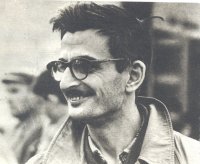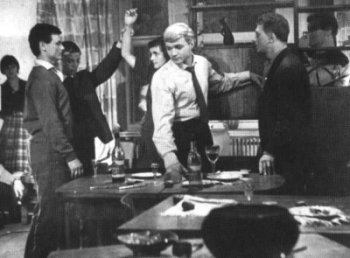The scene of the protagonist's meeting
with the ghost of his dead father became the focus of major political
intervention when Soviet premier Nikita Khrushchev attacked the film,
originally entitled Lenin's Guard, after a screening in 1963.
Khrushchev was outraged by the father's refusal to answer his son's question
about the meaning of life. This and many ideological faults of the film
resulted in its being renamed, cut (for instance, almost the entire sequence
of poetry reading in the Politechnical Museum), and re-edited.
Lenin's Guard was the conclusion and the absolute climax of the openly
militant Soviet cinema of the 1950s and 1960s.
Its plot seems to be buzzing from the questions that young people were asking
themselves. [E]ach of the heroes is organically linked to the social,
psychological, and emotional space which formed the core of the era, and
which manifests itself so triumphantly and freely in the central episode of
the film-the scene of the May Day parade. This scene for the first and,
perhaps, for the last time captured on the screen a spontaneous and joyful
procession of free people.
— Miron Chernenko, Marlen Khutsiev, pp. 13, 15
Shpalikov's [scriptwriter for Lenin's Guard] contribution was
twofold: he unblocked the pent-up dam of lyrical poetry that had been denied
to Soviet filmmakers under Stalin; and he also re-introduced the everyday,
the sense of real people, places, and time.
The influence of Shpalikov's de-dramatization, his reliance on nuance and
atmosphere—above all on the empathy that the audience must bring to the
film—can be felt across many of the key Soviet films of the decade.
— Ian Christie, "Back in the USSR", Film Comment 36.6
(Nov-Dec 2000), p. 40
|  Marlen Khutsiev
(b. 1925) graduated from the State Institute of Cinematography in 1952.
One of the leading cultural figures of the Thaw, Khutsiev made films that
were both popular with the audience (especially the 1956 Spring on
Zarechnaia Street) and symbolic of the era's dreams and illusions. In
1965, the film I Am Twenty got a Special Jury Prize at the Venice Film
Festival. In the 1970s Khutsiev worked on TV. In 1992, Khutsiev's film
Infinitas won two awards at the Berlin International Film Festival. The
director in currently working on a film about Aleksandr Pushkin.
Khutsiev received a prestigious award "For Services to the Motherland."
|

